
For busy pastors, it offers a flexible, efficient and cost-effective way to pursue an advanced degree. Here, five experts survey the landscape.
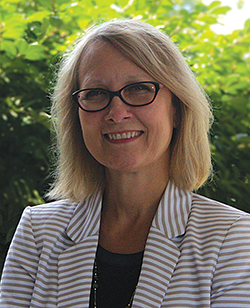
Associate Dean for Distance Education
United Theological Seminary
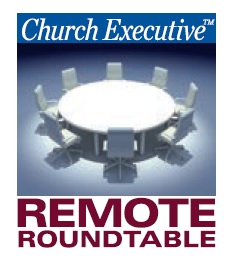 Do you see a lot of full-time ministry leaders embracing advanced degrees via distance learning right now? If so, what’s driving that interest? Are certain areas of focus / concentrations proving most attractive?
Do you see a lot of full-time ministry leaders embracing advanced degrees via distance learning right now? If so, what’s driving that interest? Are certain areas of focus / concentrations proving most attractive?
Phyllis J. Ennist, M.Ed: With the increasing role of technology in our daily lives, we’re seeing many full-time ministry leaders choosing distance education to pursue an advanced degree.
The majority of students we work with are active in ministry and want to remain in their ministry context while continuing their education. Like other seminary students, they desire educational enrichment, credibility and professional credentials. Distance learning lets them pursue those goals while maintaining their work, ministry and family obligations.
Plus, they like that they don’t have to take on the cost of relocating to attend seminary.
Generally, students are seeking practical skills for ministry leadership with a strong theological foundation. Popular areas of study among our students focus on specialized areas of ministry, including preaching, spiritual renewal, church planting, chaplaincy and pastoral care.
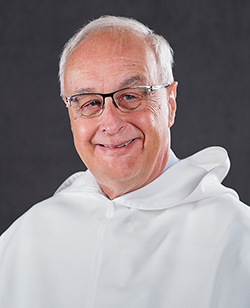
Professor of Preaching and Evangelization
Director of the Doctor of Ministry in Preaching
Aquinas Institute of Theology
Rev. Gregory Heille, O.P., D.Min.: We see many students pursue advanced degrees through distance learning largely because it offers a balance between the demands of full-time ministry and the need to remain theologically current. This enables students to respond pastorally to the questions of those whom they serve.
Aquinas Institute of Theology, a graduate school sponsored by the Order of Preachers, commonly known as the Dominicans, offers the only Catholic D.Min. in Preaching in the world. We chose a D.Min. over a Ph.D. because our discipline involves the praxis-theory-praxis model of practical theology. Full-time ministers benefit from the contextual model afforded by the hybrid of online learning and intensive face-to-face seminars.
While our degree serves traditional pulpit pastors and those who wish to teach them, today’s ministry also reaches beyond the walls of the church to the unchurched and to people at the margins and peripheries of society. The Dominicans focus on the preaching and salvation of all people, and thus our students are challenged to ask what this means for an advanced understanding of preaching ministry today.
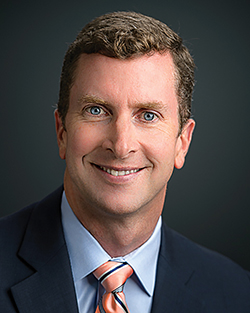
Professor of Practice in Management
and Operations
Faculty Director
The Center for Church Management at the Villanova School of Business
Matthew F. Manion: We’ve seen a steady increase in full-time ministers embracing advanced degrees. Many congregations can no longer afford to give a strong leader two to three years “off” for on-site advanced studies. And many ministers completed their undergraduate work with significant debt and need to work full-time to pay the bills while pursuing additional degrees.
Today’s technology circumvents these problems with distance learning that is so much better than what was available just 10 years ago. The wide embrace of this technology results in impressive outcomes. If you can use the internet, you can take a course from a professor anywhere in the world.
Given our school’s focus, we’ve seen growth in leaders who want to improve their strategic, management and temporal ministry skills. We have also heard of more leaders completing advanced studies in theology and pastoral ministry through distance learning.
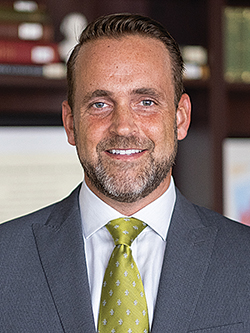
President; Associate Professor of
Historical Theology
Knox Theological Seminary
Scott Manor, Ph.D.: We recently completed a survey of current students and alumni to discern the answer to this question. At the core of most answers were (1) a sense of higher calling from God to be equipped for ministry work, and (2) being able to have seminary education work with their existing, busy life.
This fits with other data showing seminary students are working 20+ hours / week, are typically over 30, and take at least four years to complete the degree. In short, they’re expecting seminaries to structure their education to fit within their existing lives and ministry work.
At the master’s level, the MA (Biblical and Theological Studies) degree is the most attractive program of study, followed closely by the M.Div. Perhaps unsurprisingly, those already engaged in full-time vocational ministry tend to cluster into the M.Div., as well as D.Min., programs. Our accrediting body has granted permission to offer our M.Div. 100% online, and a majority of the D.Min. may be completed online as well.
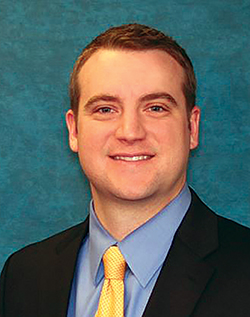
Vice President for Academic Affairs
Luther Rice College & Seminary
Evan Posey, Ph.D.: For ministry leaders, the driving interest is that they no longer have to send their staff “off to seminary” — especially appealing in ministries not conveniently located near a Bible college or seminary.
Over the past several years, we’re seeing a shift towards shorter, specialized graduate degrees and away from the generalized M.Div. The graduate degrees that prove most attractive focus on a particular discipline, such as counseling, leadership, biblical studies, or theology and apologetics.
How does the number of full-time ministry leaders using distance learning in pursuit of advanced degrees compare to, say, 10 years ago?
Heille: Moving from residential to hybrid learning in 2000 tripled our school’s D.Min. in Preaching’s enrollment, which remains our most-enrolled program. Students take courses sequentially as members of a cohort. On average, we field a new cohort of 15 students every other year.
Manion: When I completed my online Master of Science in Church Management (MSCM) degree from Villanova in 2011, I graduated with 11 classmates. This past May, we had 42 students earn an MSCM. That’s a 350-percent increase in just one program.
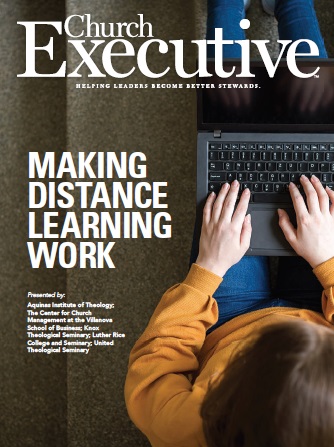
Manor: According to enrollment data from our accrediting body (ATS), total online students have more than doubled in the past decade. More and more ATS schools are providing distance courses, and educational assessment results actually show that performance among distance students is as strong — or stronger — than their peers in residential courses. These data points are consistent with what we’re seeing at Knox, where we have an excellent, dedicated and motived group of students.
Posey: Our seminary’s enrollment mix 10 years ago looks quite different from the mix today. Although a significant percentage of our enrollment has always been through distance education, in 2009, on-campus enrollment was approximately 25%. Today, on-campus enrollment accounts for only two percent.
Within the last 10 to 15 years, distance learning’s reputation has completely changed. Once thought a less-than-ideal learning experience, disruptive technologies have allowed institutions to provide meaningful, interactive and academically rigorous experiences that rival the traditional experience.
Ennist: Ten years ago, United was just beginning to offer comprehensive distance learning programs. Through distance education, we were able to show students how they could stay in their community and complete the program without a move by making the time on campus minimal and the program affordable.
Now, most of our master’s students take online courses, and all D.Min. students are engaged in a mentor-based program that enables them to study in their ministry context.
As you look at your current students — particularly in the D.Min. program — about how much of their pursuit of those advanced degrees is conducted via distance learning?
Manion: Ninety-eight percent of our program is conducted through distance learning. Our students come to campus for a one-week residency for their first course in the program. They return two years later to receive their diplomas, together. The rest of the coursework is completed via distance learning.
Manor: Our D.Min. students only have to take three of the eight courses via our intensive residential schedule; the remainder may be done entirely online. This residency requirement is in alignment with accreditation requirements. And while our D.Min. students enjoy coming here for the occasional week-long intensive course (South Florida is a great place in January!), most take the majority of their courses online.
Posey: The more advanced one’s academic pursuit becomes, the more important peer review and interaction becomes. Consequently, doctoral degrees have been slower to move to a completely online format.
However, the student who experienced the convenience of completing a graduate degree through distance learning naturally seeks the same convenience at the doctoral level. For example, our D.Min. program consists of 30 credit hours (10 courses), six of which can be completed entirely through distance learning. The four courses that must be completed on-campus entail group discussion, lectures by leading professionals, and critical peer-to-peer review.
Ennist: United has been intentional to structure the D.Min. program to be accessible to students who want to remain in their ministry location, while devoting time in person with faculty, peers and mentors. The program encourages students to work in their local community to address a specific need through action-based research. D.Min. students attend two intensive weeks and two cohort meetings annually.
Heille: Advanced ministerial students are eager to make sense of their ministerial experience. For this reason, their learning begins and ends in their places of ministry. Each cohort includes a globally and ecumenically diverse community of ordained and lay men and women of different generations and points of view. The cohort becomes a safe place for students to take stock of themselves, expand horizons, and find renewed purpose and deeper meaning.
As you offer online coursework, how is your institution making the distance learning experience as student-friendly as possible — especially for students who are in full-time ministry?
Manor: At Knox, we are invested in providing a great student experience. First, our online program is designed to bring students the exact same content as our residential program. Online courses are semi-synchronous, meaning there’s a certain amount of reading, videos and assignments that must be completed each week. Students begin and end each week together, but they’re able to complete these assignments within that time whenever it suits them.
Second, there are many opportunities for students to engage one another and the professor throughout the course — discussion forums, emails, or live video conferences. No student will feel like they’re learning in isolation.
Finally, our class sizes are small (typically no more than 15 students), allowing the professor and students to get to know one another well. We also offer live video conferences. Our students also appreciate that each written assignment is returned within one week with thoughtful feedback from the professor, allowing them to understand both areas of strength and room for growth in their work. Student feedback on their experience in online classes has been very positive.
Posey: The use of video conferencing tools, such as Blackboard Collaborate, is vital in developing relationships between the professor and the student because it introduces two-way, face-to-face interaction. At Luther Rice, professors use this technology each semester to keep regular online office hours and host classroom discussion sessions.
Also, policies must be written with the distance learning student in mind — policies that govern attendance, late submissions, academic integrity and course offerings — and the administration must also consider distance learning students’ needs when determining faculty course loads and non-instructional duties such as advising and online office hours.
Finally, we must remember that there is a real person behind every assignment submitted, every discussion board post, every email, and every financial transaction.
Ennist: For us, “student-friendly” means more than managing time constraints. Students need learning that increases their capacity to be effective in ministry, which requires engagement with peers and instructors, while experiencing and applying what they learn in
live situations.
We’re also concerned about their time away from ministry, so we offer courses in multiple formats.
In the upcoming academic year, we’re introducing a new schedule for master’s courses, which makes earning a degree from anywhere less costly, with less time away, while maintaining the program goals’ integrity.
Regardless of the modality, it’s important that courses promote lively discussion facilitated by professional instructors with expertise teaching in the online environment. We have provided extensive training, and most of our instructors have at least 10 years of experience teaching online.
To further engagement, our seminary recently introduced the Live Interactive Virtual Education (LIVE) classroom, which allows distance students to join on-campus classes with other students and the instructor in real-time, online. This cultivates a deeper sense of community and learning.
Heille: Ministerial education is by its nature both personal and communal, even when pursued across geographical distance. As members of our cohort negotiate a covenant during their first semester of hybrid study, peer learners articulate their core values and vision as a learning community. Students and teachers get to know each other well and as colleagues, support each other, offer insight, and call one another to accountability.
Manion: Our MSCM programs offer the flexibility to watch videos, participate in discussion boards, and complete assignments when convenient for participants — early morning, during the day, or late at night. We also use micro-learning, so busy leaders can consume content in smaller, bite-sized pieces if they choose.
Online learning allows us to create an international community of learners who can meet without the time and expense associated with travel. With a simple click on your phone, we create relationships that last long after class is over. The cohort that gets to know professors in person, learns in a classroom setting, and breaks bread together for the one-week residency at the beginning of the program becomes an international community sharing experiences and insights as they learn together.
Another benefit of online learning is that lectures and video conferences are recorded and stored. Students can revisit content and perhaps even share it with their employees or co-ministers, expanding the learning arena and exploring how to apply lessons in their local church setting.
Of course, cost is also a consideration for many full-time pastors. In what ways can a busy church leader make distance learning more financially manageable?
Posey: First, shorter, specialized graduate degrees typically translate into fewer dollars spent to finish an advanced degree. Many institutions have 36– to 45-credit-hour graduate degrees that will transfer into the longer M.Div.
Second, a shorter graduate degree allows the pastor to take fewer classes in the same amount of time that he would budget for a longer program. So, the pastor can pay for each course before moving on to the next. Many institutions offer cash payment plans.
Third, pastors should avail themselves of institutional aid offered by their church and the school they’re attending. Many churches have designated funds for professional development. Many schools have need- and academic-based programs that award institutional aid.
Finally, pastors may also take advantage of federal financial aid. While the ability to offer federal financial aid varies from one institution to another, it is an available option at many institutions.
Ennist: Certainly, the flexibility of distance education opens some doors in the area of affordability; full-time pastors and church leaders can earn a degree from wherever they live, and also continue to work.
We’ve also found that churches and denominations are supportive of professional development for people serving the church and often have resources to help defray costs.
I would remind church leaders that education is about more than a degree; it’s about renewing and growing their capacity for ministry. With that in mind, I encourage church leaders to seek out a program that both ignites their passion for ministry and allows them to study at a pace that fits their lifestyle and commitments, whether that’s through a shorter degree path, full- or part-time study.
Heille: Some D.Min. students are blessed to receive financial support from their sponsoring institutions, and a few have the personal means to pay for advanced education. A majority apply for financial aid, and a few make the consequential decision of taking on debt.
As a school, we offer as much financial aid as possible and counsel students as to how they can fund their education. As ministers in the Church, we all are mendicants, seeking the support of others for the sake of the Gospel.
Education is costly at many levels. The commitment to our D.Min. degree requires the discipline of eight to 10 hours per week of study. A network of understanding and support needs to be found at home, in ministry, and with the cohort. Of course, the minister receives payback as his or her vocation is renewed.
Ultimately and most importantly, the transformative learning of the minister’s D.Min. experience is fruitful to the lives of our students and communities being served.
Manion: Learning how to be a stronger church leader is an investment, not an expense. The right program and education can be a game-changer in a pastor’s effectiveness, satisfaction and longevity in ministry, benefiting your church, your employees, and your flock.
If cost is prohibitive, look for partners to join you. There are people in your church committed to your leadership, as well as foundations committed to supporting church leaders; they’ll provide additional financial support. For example, as a sign of commitment to building good stewards of God’s gifts, Villanova University’s School of Business offers a 25-percent scholarship for our MSCM for anyone who works for a church.
A wise pastor once told me, “If God places the order, God will pay for the order. Our job is to get the order right.”
Manor: On one hand, we work very hard to keep tuition as low as possible.
On the other hand — because we want to partner with students and their churches to share the financial burden — we have a “Church Partnership Program” in which Knox matches up to one-third of a church’s contribution on a qualified seminarian’s behalf. This has been the most popular, effective means by which students are able to complete a degree with little to no debt.
— Reporting by RaeAnn Slaybaugh



this information is helpful, nice post
Thanks for sharing the information about the Distance Learning Program Courses.Keep sharing more information and I will also share with my friend’s thanks a lot once again